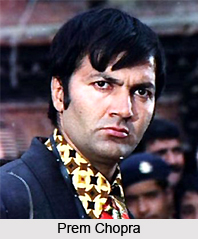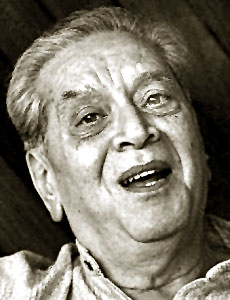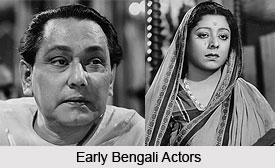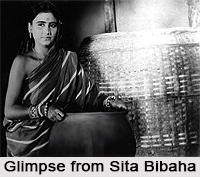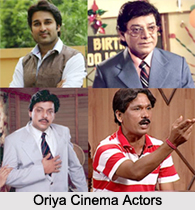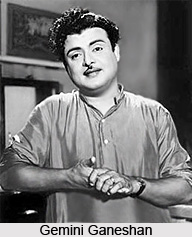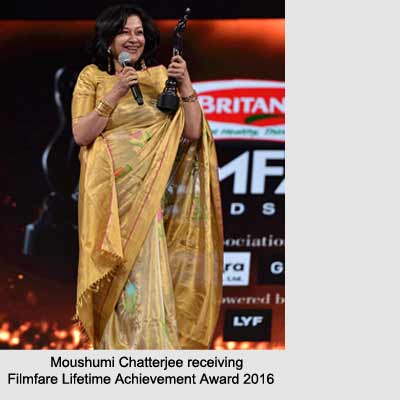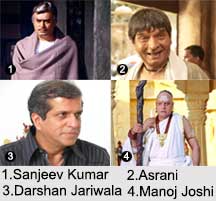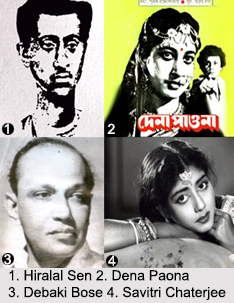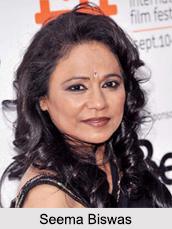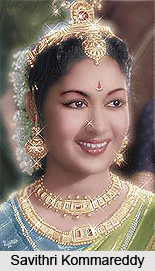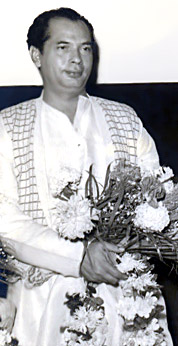 Bimal Roy began his career in his home city Kolkata as a cameraman in the prestigious New Theatres Studio. He later worked with Pramathesh Chandra Barua. The humanist dimension, which characterizes a great part of his oeuvre, can be seen in his first production, a documentary entitled, Bengal Famine (1943). He made this documentary at the very time of this catastrophe, which claimed the lives of 5 million people.
Bimal Roy began his career in his home city Kolkata as a cameraman in the prestigious New Theatres Studio. He later worked with Pramathesh Chandra Barua. The humanist dimension, which characterizes a great part of his oeuvre, can be seen in his first production, a documentary entitled, Bengal Famine (1943). He made this documentary at the very time of this catastrophe, which claimed the lives of 5 million people.
In Kolkata his first fiction film was for the New Theatres was a powerful film which transposed the values of Bengali sensibility to the level of All-India Films. This was Udayer Pathey (Humrahi in Hindi). This film described the first experiment in the experimental cinema in India and depicted certain pre-Independence ideals, revealing a personal sense of composition and flowing camera movements to the music of Raichand Boral. This social and sentimental film is considered by Indian cinema historians as having opened a path to the neo-realist current in later Bengali cinema.
The dynamism of Bombay drove him to settle there and he founded his company in 1952, the Bimal Roy Productions. This was to produce in 11 years 13 of the 21 films he made in his career. His inclination for realism was encouraged by the discovery of Indian neo-realism-The Bicycle Thief of Vittorio de Sica and the work of Rossellini among others. Till date Do Bigha Zamin (1953) is his finest film and at that times the most famous in India and Europe. It bagged the International Critics Award at Cannes in 1954. The film deals with landless farmer who migrates to the city from his village and the ordeal that he had to face.
In 1954 Bimal Roy directed a more clamorous and socially aware remake of a Bengali film in 1946, Biraj Bahu. It dealt with the life of a loving woman, Biraj, whom the hardness of her husband and the necessity of getting dowry for his sister reduced her to a domestic slave. She eventually adopts a cynical view to the men whom the social order has transformed into tyrants and whom it is impossible to fight. The following year, 1935, he made his own version of P.C. Barua`s Devdas and dedicated it to Barua and K.L. Saigal.
This film, in which, the lead roles were played by the beautiful and gifted actress Suchitra Sen and the great actors Rajvansh Motilal, Dilip Kumar and Vyajayantimala. He distances his hero from the psychological states of Barua`s hero and breathes into him a sarcastic and more social dimension, in tune with an independent and optimistic India. His 1959 film, Sujata, is a reformist classic adapted from a Bengali novel, served by refreshing acting of Nutan and Sunil Dutt. The film was a social satire that dealt with themes of class difference.
In 1964 came Bandini, which once again starred Nutan and Ashok Kumar. It was one of his technically perfect films. Meanwhile Roy tackled in 1958, an atmosphere and a theme unusual in his work, with Madhumati and the screenplay was by Ritwik Ghatak. The lead roles in this film were played by Dilip Kumar, Vyajayantimala and Pran.
Frightening and romantic at once, this spellbinding film was the greatest commercial success in Roy`s career. Like Guru Dutt, Roy did not try to subvert the traditions of the all-India cinema of his time but shaped it from within, at the thematic, technical and aesthetic levels.
Awards Won by Bimal Roy
Won seven Filmfare Best Director Awards:
* 1953 for Do Bigha Zamin (Two Acres of Land)
* 1954 for Parineeta
* 1955 for Biraj Bahu
* 1958 for Madhumati
* 1959 for Sujata
* 1960 for Parakh
* 1963 for Bandini
Won four Filmfare Best Movie Awards:
* 1953 for Do Bigha Zamin
* 1958 for Madhumati
* 1959 for Sujata
* 1963 for Bandini
National Film Awards
* 1954: Certificate of Merit: Do Bigha Zamin
* 1955: All-India Certificate of Merit: Biraj Bahu
* 1956: Certificate of Merit: Devdas
* 1959: Best Feature Film in Hindi: Madhumati
* 1960: All-India Certificate of Merit: Sujata
* 1963: Best Feature Film in Hindi: Bandini
Career as a Director
* Bengal Famine (1943)
* Udayer Pathey (1944)
* Hamrahi (1944)
* Anjangarh (1948)
* Mantramugdhu (1949)
* Pehla Aadmi (1950)
* Maa (1952)
* Parineeta (1953)
* Do Bigha Zamin (1953)
* Naukari (1954 )
* Biraj Bahu (1954)
* Baap Beti (1954)
* Devdas (1955)
* Yahudi (1958)
* Madhumati (1958)
* Sujata (1959)
* Parakh (1960)
* Immortal Stupa (1961)
* Prem Patra (1962)
* Bandini (1963)
* Life and Message of Swami Vivekananda (1964)
* Benazir (1964)
* Gautama the Buddha (1967)








